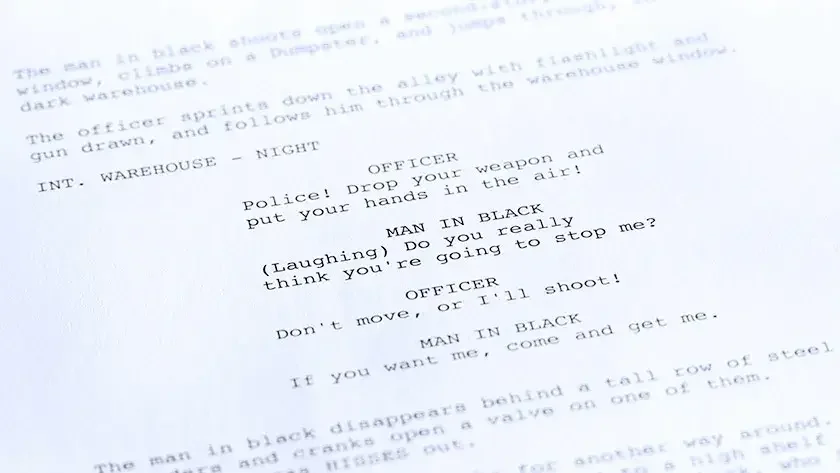Writing a script takes time, effort, and creativity. After pouring your heart and soul into every line, the thought of someone stealing your work is frustrating. That’s why it's a good idea to register your copyright through the U.S. Copyright Office (USCO) before you start shopping your new script to production companies. Learning how to copyright a script gives you the legal protection you deserve, allowing you to officially protect your script from theft, plagiarism, or other forms of infringement.

How does copyright apply to scripts?
A script is a written blueprint of a play, show, or movie. A screenplay, however, has a narrower definition—it’s specifically a television program script or a film script. While there are subtle differences, a play, show, and film script all count as intellectual property. The rules and processes for how to copyright a screenplay and a script are roughly the same.
Copyrighting is among several categories of intellectual property protection, similar to trademarks and patents, designed to safeguard your “exclusive right” to claim an original work as your own—for a limited period of time. So long as your work represents the original (and not a reproduction) and has been reduced to a “tangible form” (that is, it has been written on paper, typed electronically, recorded digitally, and so on), the work is granted protection under copyright law.
At a basic level, copyrighting a creative work—such as a movie script—has the effect of prohibiting individuals from engaging in copyright infringement or unauthorized use of your script. This includes intentional and inadvertent copying, publishing, transmitting, exhibiting, distributing, modifying, displaying, or otherwise using—whether for profit or not—the original creative expressions of others.
Why copyright a script?
Scriptwriters should copyright their work to secure ownership and prevent others from stealing or using their ideas without permission. A registered copyright gives you full legal rights, making it easier to prove ownership and control how your script is used.
It also gives you the ability to take legal action, recover damages, and protect your hard work. If someone steals your script or uses it without your permission, you should have a copy of the script on file with the USCO to prove that your rights to copyright protection have been violated. Unless and until you copyright your script and have it on file with the USCO, it can be difficult to pursue an infringement action in federal court. Meanwhile, the wrongdoer may profit from plagiarizing your hard work.
A creative work that has been formally granted copyright protection by the USCO is typically identified by the familiar © symbol. You don't need to attach a copyright notice to your script for it to receive copyright protection, but a notice has the effect of identifying the registered copyright owner and informing others that the script is copyrighted. This can typically be accomplished by including the copyright symbol © in the footer of each page.
How to copyright a script in 4 steps
All original works, including scripts, immediately and automatically attain common law copyright status as soon as they are in writing. But taking the extra steps to complete copyright registration with the U.S. Copyright Office is worth it.
1. Register your script with the USCO
The USCO offers an online registration system known as “eCO,” which stands for Electronic Copyright Office. It permits a scriptwriter to complete the registration process electronically simply by setting up a username and password. And while you may register a copyright by mail, the electronic registration process is faster and less costly.
When filling out the copyright application form, you'll need to provide your contact information, the title of your script, and the name and contribution of each author. The process is simple and can usually be completed online in one sitting.
2. Pay the required fee
When you apply online, basic copyright registration of one work with a single author costs $45. Paper filing costs $125. You can pay by credit, debit, ACH transfer, paper check, or money order.
When you fill out the copyright application, you’ll see an expedited option known as “Special Handling.” It’s only available in certain situations, for example, if there’s pending litigation or contract deadlines. There’s also a significant fee of $800.
3. Submit a copy of the script
The USCO requires you to submit a copy of your script. You can upload your script directly on the USCO website if you're applying online. If you're submitting a physical copy, you'll need to mail it to the USCO. Make sure your script is clear and easy to read. You won’t get this copy back, so keep your original safe.
4. Wait for your registration to be processed
Once you’ve submitted your application and paid the fee, obtains the immediate benefits of formation registration. You don’t have to wait for the official copyright certificate.
If you submitted your copyright application online, you'll receive an email confirmation that your application was received. In some cases, it may take several months to a year to receive notice that your copyright registration has been approved.
Benefits of script copyright registration
Copyright registration with the USCO protects the work for the life of the scriptwriter, plus 70 years. Registering your copyright provides significant benefits.
- Creates a public record: Copyright application and registration are proof of your copyright ownership and the date the script was created.
- Allows you to sue others for infringement: Once your copyrighted script is on file, you can sue to recover monetary damages for any economic loss that may result from the infringement. And, if you register your copyright before the infringement occurs, you can sue for copyright infringement and seek recovery of statutory damages and reimbursement of legal fees.
Reasons to consult a copyright lawyer
Copyright registration is typically a straightforward process, but you might still want to talk to a copyright lawyer, especially if these situations apply to you:
- Complex ownership issues. Co-writing a script or adapting it from other sources can lead to confusion over ownership. A lawyer can help create clear agreements to avoid future problems.
- Protecting against infringement. A copyright lawyer can explain how to copyright a script and help you if someone infringes on your copyright, for example, by sending a cease and desist letter or filing a lawsuit in federal court.
- Adaptations and derivative works. If your script is based on a book, movie, or other material, a lawyer can make sure you’ve secured all necessary rights.
- International copyright. A lawyer can help you protect your script in multiple countries and navigate the various copyright laws.
- Clearing script elements. A lawyer can help you clear music, trademarks, or real-life references in your script so that you don’t get in trouble for things like unauthorized use or defamation.
Ready to protect your hard work? We can help you register a copyright, and we’ll provide confirmation when the Copyright Office receives your work. Whether you want to protect a movie, play, TV show, or film treatment, we’re here to guide you through the process.
FAQs
When should I copyright my script?
You should copyright your script as soon as it's complete, especially if you plan on sharing it with a third party, like a production company. You can also copyright things like treatments and character descriptions before your script is finished. A copyright or entertainment lawyer can help you determine what to copyright and when.
How long does copyright protection last?
In most cases, copyright protection lasts for the author’s lifetime plus 70 years. After that, the work enters the public domain, meaning anyone can use it without permission.
What’s the difference between WGA registration and federal copyright registration?
Writers Guild of America (WGA) registration is not the same as copyright. WGA registration provides proof of authorship but doesn’t offer the legal protection that federal copyright registration does.
You can register your script with the WGA by filling out a quick form online. You should also still register with the U.S. Copyright Office for full legal protection.
What is ‘poor man’s copyright’?
Poor man’s copyright is when you mail a copy of your work to yourself and keep the sealed envelope as proof of ownership. However, this method offers little additional legal protection and is not a substitute for proper copyright registration.
Can I copyright a script idea?
No—you can’t copyright ideas. Copyright law only protects works in “tangible form,” which means it has to be written out. Only the actual script, including dialogue, scenes, and specific written elements, can be copyrighted.
What happens if someone infringes on my script’s copyright?
If someone uses your script without permission, you can take legal action. A registered copyright allows you to file a lawsuit, seek damages, and potentially recover legal fees.
Jonathan D. Layton contributed to this article.



